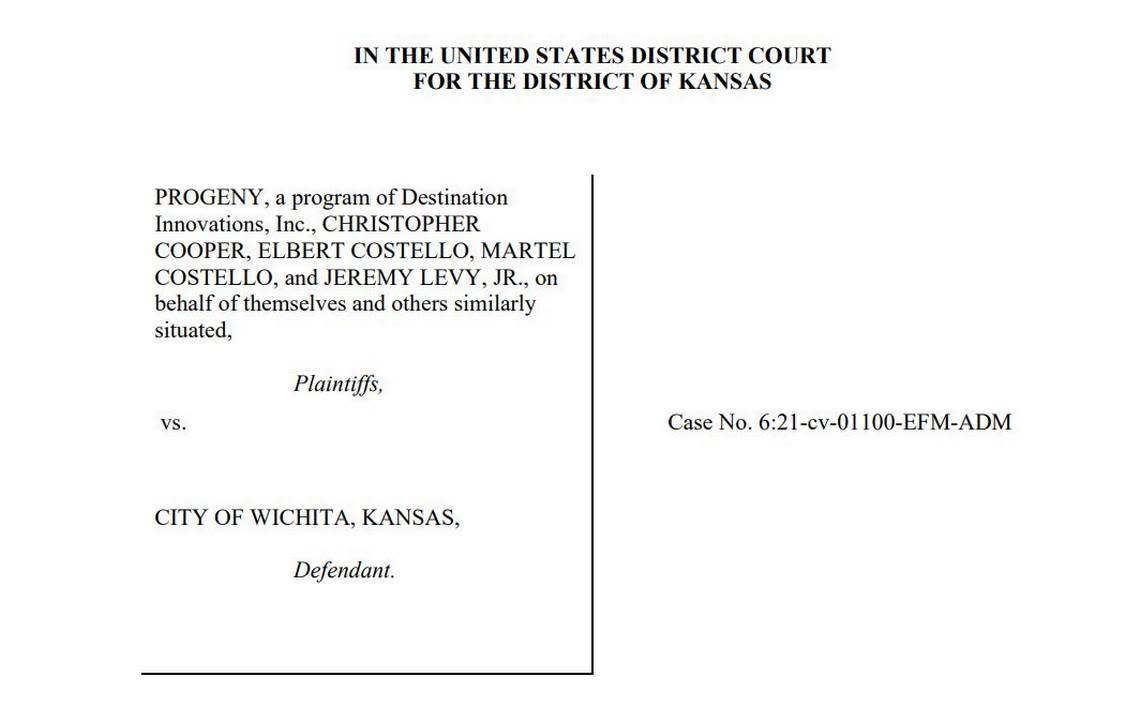Class-action status granted for people on Wichita police gang list in lawsuit against city

A federal court in Wichita has granted class-action status to 5,245 people on the Wichita Police Department’s gang list.
U.S. Judge Eric Melgren’s decision clears the first major hurdle in a lawsuit that claims the city’s criteria for labeling people “criminal street gang members” and “gang associates” are too vague. The federal court suit, filed by the ACLU and the Kansas Appleseed Center for Law and Justice in 2021, seeks to strike down a state law and city policy that list the criteria for police to label people as members or associates of criminal street gangs.
Class-action status allows them to represent others on the gang list who may not know they are on it and have no way to have their names removed.
The department’s gang list includes 5,245 people — 1,728 active gang members, 3,296 “inactive gang members” and 221 “gang associates.” List members are subjected to intense police scrutiny, frequent stops and searches over minor traffic infractions, minimum $50,000 bail if charged with a violent crime and longer sentences in higher-security prisons if convicted, according to the lawsuit.
“What this means is that we can go forward as a class, to represent the rights of everybody that’s on the gang list,” Teresa Woody, a lawyer for Kansas Appleseed, said. “...That means if we’re successful, the relief we’re asking for — which is basically to change or modify the procedures for getting on the gang list to meet constitutional muster — would apply to everyone on the gang list.”
Officials with the city of Wichita did not comment, citing the lawsuit.
“We cannot comment on pending litigation,” Megan Lovely, city spokesperson, said in a statement.
Under the city’s policy, and the Kansas law that empowers it, most Wichitans could be added to the list, which identifies a person as a gang member or gang associate based on a loose set of criteria such as where a person lives, what color clothing they wear, where they shop or buy gas and with whom they are photographed, the lawsuit alleges.
The policy grants broad discretion to Wichita police to decide who gets added to the list. Kansas Appleseed and the ACLU Kansas allege that the police department has disproportionately targeted racial minorities — 60% of the people on the gang list are African-American and 25% are Hispanic. Only 6% are white.
The city does not notify people when they are added to the gang list, and there’s no way to challenge it or have your name removed.
Lawyers with the ACLU and Appleseed filed the case on behalf of Progeny, a nonprofit juvenile justice organization, and individual plaintiffs Christopher Cooper, Elbert Costello, Martel Costello and Jeremy Levy, Jr. Progeny alleges the gang list has hindered its efforts to organize about juvenile justice because it could put some attendees in legal jeopardy for associating with each other.
Outside of law enforcement, no one is supposed to know who is on the Wichita Police Department’s secret list of alleged gang members and associates.
But the gang list is not always private.
“It’s supposed to be confidential,” Woody said. “It clearly isn’t totally confidential. I mean, we know that a former captain of the Wichita Police Department was charged with releasing some of that information.”
Earlier this year, former Captain Wendell Nicholson was charged and entered a diversion agreement for leaking confidential internal records, including gang list information, to a Walmart security guard.
Depositions in the case also suggest that Wichita police officials have illegally shared confidential information with landlords and business owners to block alleged gang members from renting at certain properties or hosting events at different venues.
Woody said everyone should care about the outcome of the case, even if you never break the law.
“This is allowing them to put people on a list and say you’re a criminal,” Woody said. “A law-abiding citizen can end up on the list because you don’t have to be charged or even suspected of criminal activity to be on the list.
“And I think the other reason to care about it is because it criminalizes people on the list and it criminalizes sectors of Wichita, whether those are neighborhoods or racial demographics or whatever.”
If the plaintiffs win, the Wichita Police Department could be forced by the court to destroy its list of alleged gang members and gang associates. Or it could give people on the list a chance to challenge the designation.
“In the event that there are modifications to the gang list, one of the things we’re going to be asking for is that everyone who’s on the list be notified and have, at the very least, an opportunity to use some procedures to get themselves off,” Woody said.


